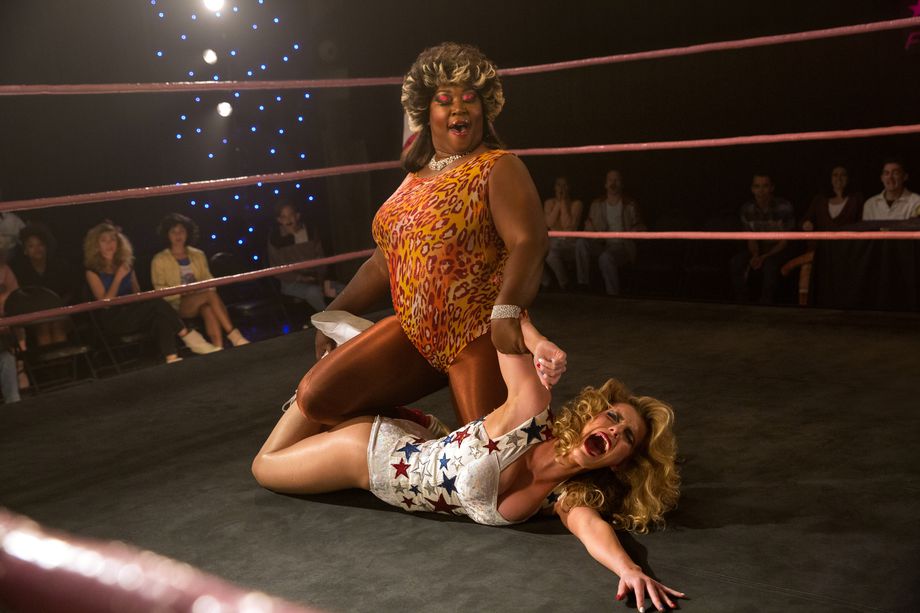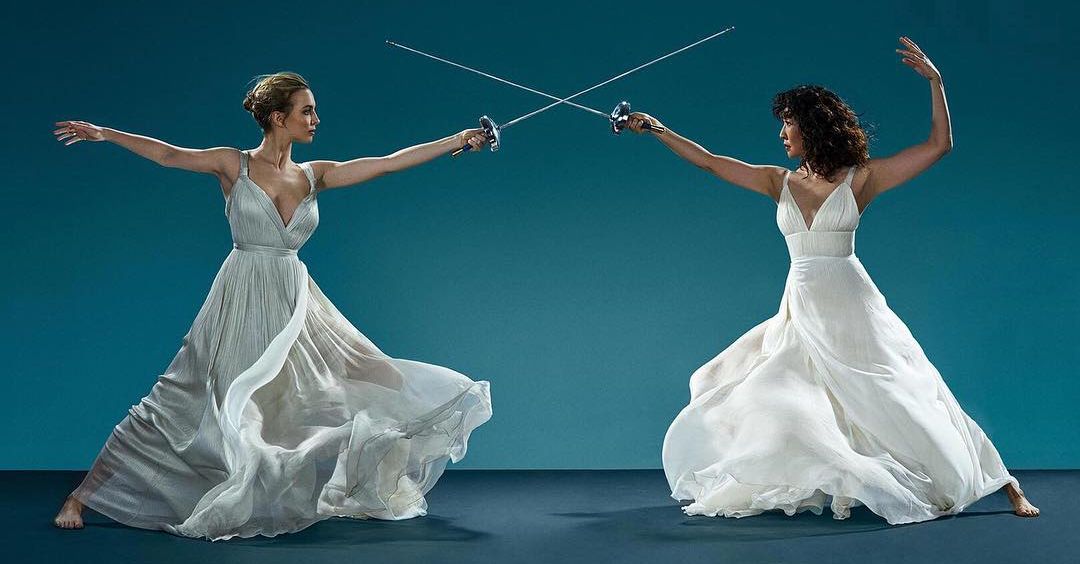
Credit: Entertainment Weekly
“You are an evolutionary necessity.”
With the second series of Killing Eve starting this month, and one of our most eagerly anticipated TV shows of the year, it seems a good point to take a look back at Luke Jennings’s original source material, and its translation to the small screen. Codename: Villanelle was originally self-published by Jennings as four separate novellas, the first (with the same name) appearing in February 2014. It was followed by Villanelle: Hollowpoint in August, then Villanelle: Shanghai and Odessa in February and June of the following year.
It wasn’t Jennings’s first published work: far from it, with Atlantic appearing back in 1995. These were mostly what Jennings calls “politely received but unprofitable novels,” adding “Our income was, to say the least, patchy.” That probably explains why he was dance critic at The Observer newspaper for 14 years. Which in turn explains the entry in his bibliography which stands out as most un-Villanelle like: his co-authorship of The Faber Pocket Guide to Ballet…
Codename: Villanelle was optioned for the screen relatively quickly after the first novella, in spring 2014. Initially pitched to Sky Living, they turned the project down, but it was reworked by writer Phoebe Waller-Bridge, to put more emphasis on Eve, and these modifications also triggered the title change. It was a wise decision, I think. Codename: Villanelle seems very passive, a label given to a character (and half-meaningless unless you’re an expert on French perfume). Killing Eve is considerably more active, and also reflects the shift in focus from the hunter to the hunted. It helped get the show picked up by BBC America, and in autumn 2016, the show was given the go-ahead for an eight episode first series. But such was the advance buzz, that a second series was commissioned before even the first episode was broadcast.
This proved to be a wise decision. For it became a word-of-mouth hit, with ratings increasing by two-thirds from the first episode to the last. Critical reaction was no less enthusiastic: Killing Eve was included in more TV writers’ top tens for 2018, than any other show. Sandra Oh’s performance as Eve was particularly lauded, and she won the Golden Globe, Screen Actors’ Guild and Critics’ Choice Television Awards for her portrayal. The success of the series helped propel the first book onto the best-seller lists, and allowed Jennings to quit his day job at The Observer. The second volume, No Tomorrow, was published in October; we’ll have a review of that up later in the week.
But for now, we’re concentrating on the first book – and in particular, comparing and contrasting the show with its source material. What are the similarities? And, perhaps more interestingly, what are the differences? [Of necessity, what follows include significant spoilers for both TV and literary incarnations]
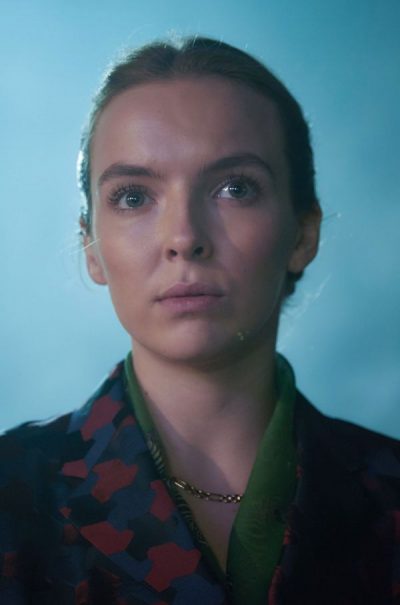 Villanelle
Villanelle
“They had recognized her talent, sought her out and taken her from the lowest place in the world to the highest, where she belonged. A predator, an instrument of evolution, one of that elite to whom no moral law applied. Inside her, this knowledge bloomed like a great dark rose, filling every cavity of her being.”
As noted above, the book leans considerably more towards Villanelle than the TV series in balancing the characters. In the show, she is initially a blank slate, and only slowly is her background revealed, as Eve peels back the layers behind her fake persona. The novel, however, fills in the basic details by page 13, while Eve doesn’t even appear until almost a quarter of the way in. Villanelle is a convicted triple-murderer, having taken revenge on the criminals responsible for killing her father – just one of a number of incidents that illustrate her socio/psychopathic nature [let’s not get bogged down in labels]. In the TV series, it’s a less family-oriented crime which gets her put away: castrating and murdering the husband of a teacher/lover.
She is then spirited out of prison by a shadowy group, known as “The Twelve” and trained in a range of lethal arts, becoming an assassin employed by them. “Shadowy” is putting it mildly for the TV version. Entirely opaque is probably closer to the truth, since we know almost nothing about them. The novel, in contrast, opens with a depiction of their meeting, and The Twelve deciding to unleash Villanelle on a target. We still don’t know who they are or their goals, however. They clearly don’t mess around though. While Konstantin, Villanelle’s handler, is in an “is he dead or not?” limbo at the end of season one, there’s no such doubt in the book. He’s 100% dead, killed by Villanelle after he has been rescued by her from kidnapping – just in case he divulged any incriminating information. Guess you never know. That’s considerably more brutal than in the show, where Konstantin does indeed “go rogue”.
The Vilannelle we see is considerably more anti-social than in the book, where she is entirely capable of hanging out with people as and when necessary. The version on the page is considerably more sexual too – likely impacted by the TV show being on basic cable – with a habit, after completing an assassination, of finding some random stranger – male or female, she’s not bothered – for a meaningless fling. For her, it’s all about making them want her, and the resulting power she has over them. [There’s also a rather gratuitous scene, describing in unnecessary detail the unpleasant sexual fetish of one victim]
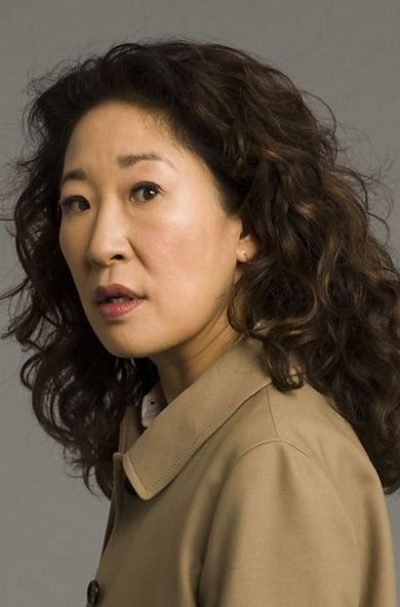 Eve Polastri
Eve Polastri
“Eve Polastri is looking down at Lambeth Bridge and the wind-blurred surface of the river. It’s 4 p.m. and she has just learned, with mixed feelings, that she is not pregnant.”
Even on the most superficial level, the small-screen version of Eve is radically different. In the book, she’s British and aged 29. The change in nationality was something BBC America required. Given their audience, it’s somewhat understandable, despite the resulting, somewhat clumsy need to explain why a Yankee is working for the British security services. That Sandra Oh is two decades older than the original Eve diminishes the suggestion in the novel that Eve and Villanelle are two sides of the same coin. Both are professional, childless women who have turned to their work, to the exclusion of almost everything else. Instead, the generation gap creates other echoes, almost a mother/delinquent daughter relationship.
Despite her youth, book Polastri has risen to become the head of her department at MI-5, which arranges special protection for visitors to the UK who are deemed at risk. She’s already intrigued by the whispers of Villanelle she has found, but this becomes a full obsession after the assassin takes out a Russian fringe politician on Eve’s turf, causing the civil servant to lose her position. Both versions then have Eve being recruited for an off-book operation to hunt Villanelle down, cutting ties with her previous colleagues.
This brings tension to Eve’s marriage with Niko, though much more so on television. In the book, while they still have their disagreements when Eve puts work before previously-arranged social engagements, there is a reconciliation (of sorts) towards the end. Niko and his academic pals help Eve crack a USB password, the device containing information that leads to an operative associated with The Twelve inside MI-5. Their marriage is certainly in a far better place at the end of volume one, than series one.
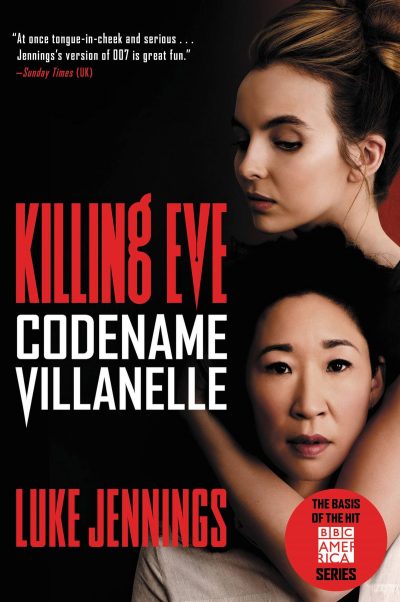 Eve vs. Villanelle
Eve vs. Villanelle
“She knows who I am. Killing Simon was a message, addressed to me. She was saying I can take you, and the people you care about, any fucking time I want…”
It’s at the nexus of the two main characters, in their relationship, that the TV series and book diverge most drastically. Because, in the novel, there pretty much isn’t one. Eve and Villanelle have virtually no conscious interaction at all. Emphasis on conscious, since the most time they spend together is when the killer slips into the spy’s Shanghai hotel room while Eve is sleeping and “inhales her warm smell.” What there is, is strictly adversarial: Eve regards Villanelle solely as a threat who must be stopped. “It’s just beginning,” are the three words from Eve with which the first book ends, as she puts a Glock 19 pistol in her bag. There’s little doubting her intentions.
What Phoebe Waller-Smith did in the show, was broaden and deepen that relationship, in a myriad of ways, both little and big. It feels more like Clarice Sterling and Hannibal Lecter in Silence of the Lambs, with a charming psychopath playing games against a dogged, somewhat dour bloodhound. By deepening the discord between Eve + Niko, and her overall discontent with life, and playing up Villanelle’s bisexuality, the TV show has added a slab of unresolved sexual tension between the pair, which simply wasn’t present in the first book. It has certainly helped make the show become a firm favourite in the gay community, though thanks to the wonderful performances of Oh and Jodie Comer, it’s far more than ghetto TV.
I do have concerns, however. In a Reddit AMA, Jennings said, “The fandom drives the success of the books and the show, and also influences it. Killing Eve: No Tomorrow would be a different book if I hadn’t spent time listening to fans.” It seems a perilous route for any creative person, to let the consumers dictate where your story goes. I’ve already seen Xena: Warrior Princess destroyed when its makers started pandering to the demands of gay fan ‘shippers. Will Killing Eve go the same way? We can only hope it doesn’t.
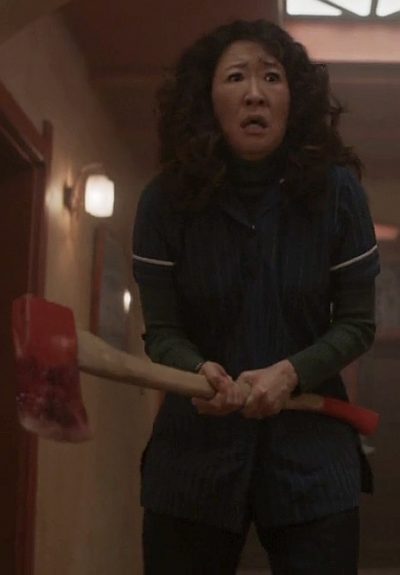 [Warning: this piece will contain significant spoilers for the show. READ ON AT YOUR OWN RISK!] It was always going to be difficult, if not impossible, for the second series of Killing Eve to match the brilliance of the first. That had ended with mousy MI-5 desk jockey Eve (Oh) stabbing ruthless assassin Villanelle (Connor), as they lay on a bed – platonically, but you could cut the sexual tension with a knife. Where would things go from there? The answer, unfortunately, is nowhere particularly much, except for some thoroughly unconvincing plot twists, such as Villanelle going to work for MI-5. Hello? Did everyone forget her cold-blooded murders of agents Bill Pargrave and Frank Haleton in season one? Let’s just pretend she’s one of us, and send her off on a mission without so much as a background check, m’kay?
[Warning: this piece will contain significant spoilers for the show. READ ON AT YOUR OWN RISK!] It was always going to be difficult, if not impossible, for the second series of Killing Eve to match the brilliance of the first. That had ended with mousy MI-5 desk jockey Eve (Oh) stabbing ruthless assassin Villanelle (Connor), as they lay on a bed – platonically, but you could cut the sexual tension with a knife. Where would things go from there? The answer, unfortunately, is nowhere particularly much, except for some thoroughly unconvincing plot twists, such as Villanelle going to work for MI-5. Hello? Did everyone forget her cold-blooded murders of agents Bill Pargrave and Frank Haleton in season one? Let’s just pretend she’s one of us, and send her off on a mission without so much as a background check, m’kay?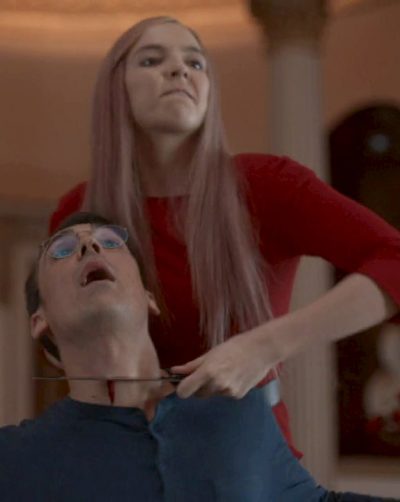 After becoming an under-the-radar hit the first time, the second set of episodes seems to have left a lot of people unsatisfied, for a variety of reason. And the ratings reflect this. Having managed the almost unprecedented feat of increasing almost every week the first time round, this season saw fewer viewers for every part after the debut, than the equivalent in series one. Maybe renewing it the day after that opening episode was a mistake? The final scene of this series ends in a mirror image of its predecessor, Villanelle shooting Eve in a fit of pique after she responds to Villanelle’s declaration of love with “You don’t know what that is,” and walks away. Of course, the renewal and critical acclaim basically make it certain Eve isn’t dead. So it’s less a case of “What will happen?”, than “What cheat will the writers use to get out of the corner into which they’ve painted themselves?” I’m going with a bullet-proof vest.
After becoming an under-the-radar hit the first time, the second set of episodes seems to have left a lot of people unsatisfied, for a variety of reason. And the ratings reflect this. Having managed the almost unprecedented feat of increasing almost every week the first time round, this season saw fewer viewers for every part after the debut, than the equivalent in series one. Maybe renewing it the day after that opening episode was a mistake? The final scene of this series ends in a mirror image of its predecessor, Villanelle shooting Eve in a fit of pique after she responds to Villanelle’s declaration of love with “You don’t know what that is,” and walks away. Of course, the renewal and critical acclaim basically make it certain Eve isn’t dead. So it’s less a case of “What will happen?”, than “What cheat will the writers use to get out of the corner into which they’ve painted themselves?” I’m going with a bullet-proof vest.




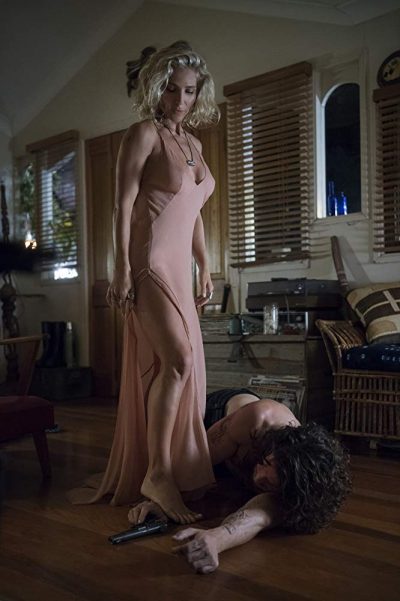 Cal McTeer (Best) has just got out of prison after serving a 12-year sentence for arson leading to murder, a crime she committed as a teenager. Returning to her home town of Orphelin Bay, she finds her brother, Augie (Jakubenko), now working as a conduit for drugs, with the connivance of at least some local cops, and supplied by the mysterious Adrielle Cuthbert (Pataky). She oversees a commune near town called L’Attente with a zero-tolerance policy for dissent, and uses the proceeds of her narco-aquatics to fund a worldwide search for mysterious fragments of pottery. Turns out she is queen of the Tidelanders: the offspring of humanity and legendary sirens who inhabit the ocean. Though Cal doesn’t know it initially, a near-death experience shows that she is of similar stock. Adrielle doesn’t like the competition. And neither does local gangster Gregori Stolin (Koman), who is intent on muscling in on Augie’s business, and cutting out the middleman, to work directly with Adrielle.
Cal McTeer (Best) has just got out of prison after serving a 12-year sentence for arson leading to murder, a crime she committed as a teenager. Returning to her home town of Orphelin Bay, she finds her brother, Augie (Jakubenko), now working as a conduit for drugs, with the connivance of at least some local cops, and supplied by the mysterious Adrielle Cuthbert (Pataky). She oversees a commune near town called L’Attente with a zero-tolerance policy for dissent, and uses the proceeds of her narco-aquatics to fund a worldwide search for mysterious fragments of pottery. Turns out she is queen of the Tidelanders: the offspring of humanity and legendary sirens who inhabit the ocean. Though Cal doesn’t know it initially, a near-death experience shows that she is of similar stock. Adrielle doesn’t like the competition. And neither does local gangster Gregori Stolin (Koman), who is intent on muscling in on Augie’s business, and cutting out the middleman, to work directly with Adrielle. I was quite surprised to hear about Amazon taking up Joe Wright’s 2011
I was quite surprised to hear about Amazon taking up Joe Wright’s 2011 
 Villanelle
Villanelle Eve Polastri
Eve Polastri Eve vs. Villanelle
Eve vs. Villanelle We recently wrote about the movie version of the Sheena story,
We recently wrote about the movie version of the Sheena story,  Usually she transforms into what she calls the “Darakna” – which essentially means she puts black mud on her body and gloves, with bone claws on to slash her enemies to death. Don’t worry: it’s neither bloody nor (after the first time they show it to us) very exciting. I just wonder if, by doing that, she also immediately became super-powered. though she already is a strong fighter. Or if it just made the killing easier for her, as she then wasn’t “quite herself” (to quote Norman Bates!).
Usually she transforms into what she calls the “Darakna” – which essentially means she puts black mud on her body and gloves, with bone claws on to slash her enemies to death. Don’t worry: it’s neither bloody nor (after the first time they show it to us) very exciting. I just wonder if, by doing that, she also immediately became super-powered. though she already is a strong fighter. Or if it just made the killing easier for her, as she then wasn’t “quite herself” (to quote Norman Bates!). That said, while the show (like most shows of its ilk at the time) is underwhelming compared to “Hercules” and “Xena”, I do think the screenwriters really tried to come up with as inventive stories as possible, given the fact that the “adventures in the jungle” was already a genre as dead as a door-nail. There are some good ideas here: plants that raise certain hormones in your blood, making you love-struck as well as murderous (therefore having Cutter and Sheena try to kill each other); a female black Rocky in the jungle, faced with countless attacks by her opponents; a kind of “X-files”-episode, with the audacity to play that show’s musical theme a couple of times in the episode; or the dangerous giant ants that eat anything. setting Cutter and Sheena in quite a distressing position.
That said, while the show (like most shows of its ilk at the time) is underwhelming compared to “Hercules” and “Xena”, I do think the screenwriters really tried to come up with as inventive stories as possible, given the fact that the “adventures in the jungle” was already a genre as dead as a door-nail. There are some good ideas here: plants that raise certain hormones in your blood, making you love-struck as well as murderous (therefore having Cutter and Sheena try to kill each other); a female black Rocky in the jungle, faced with countless attacks by her opponents; a kind of “X-files”-episode, with the audacity to play that show’s musical theme a couple of times in the episode; or the dangerous giant ants that eat anything. setting Cutter and Sheena in quite a distressing position.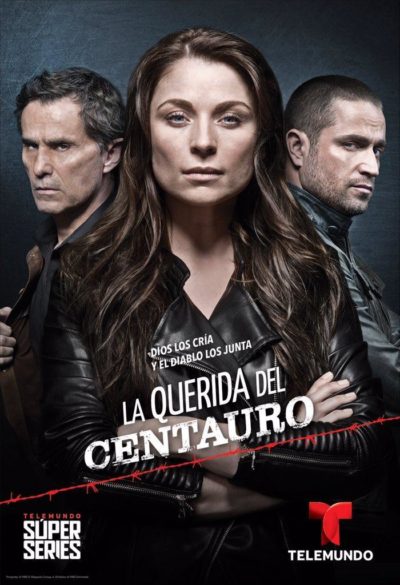 A sold enough entry, this benefits from a well-written script, but gets marks taken off for having a heroine who is rather too passive. Yolanda Acosta (Paleta) is sent to a higher security facility when she is recaptured, following an escape from her previous prison. It’s a mixed-gender facility (common in Mexico), and she comes to the attention of Benedictino Suárez (Zurita), a.k.a. “Centaur”, a local crime boss who is also incarcerated. He falls hard for Yolanda – the title translates as “Centaur’s Woman” – and when his escape plan comes to fruition, offers to bring her along with him, to the ranch on which he’s hiding out. And that’s where the problems really start for Yolanda.
A sold enough entry, this benefits from a well-written script, but gets marks taken off for having a heroine who is rather too passive. Yolanda Acosta (Paleta) is sent to a higher security facility when she is recaptured, following an escape from her previous prison. It’s a mixed-gender facility (common in Mexico), and she comes to the attention of Benedictino Suárez (Zurita), a.k.a. “Centaur”, a local crime boss who is also incarcerated. He falls hard for Yolanda – the title translates as “Centaur’s Woman” – and when his escape plan comes to fruition, offers to bring her along with him, to the ranch on which he’s hiding out. And that’s where the problems really start for Yolanda.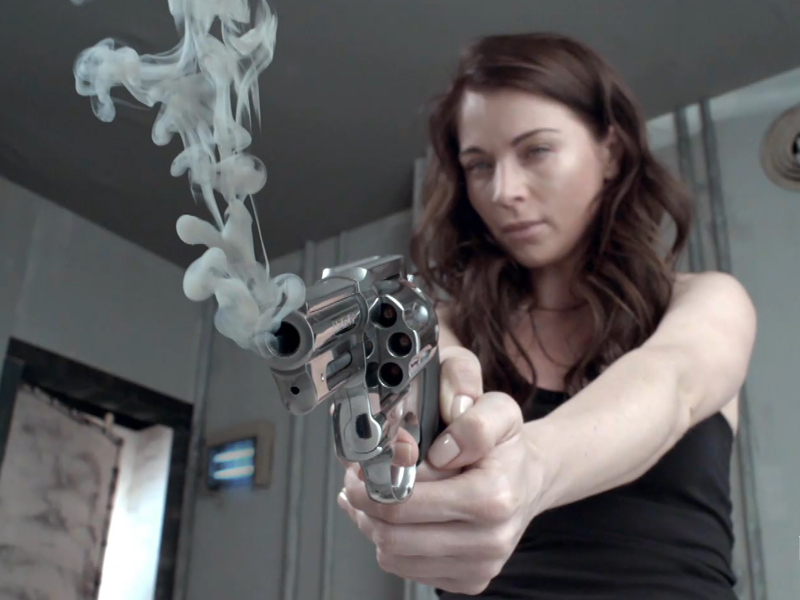
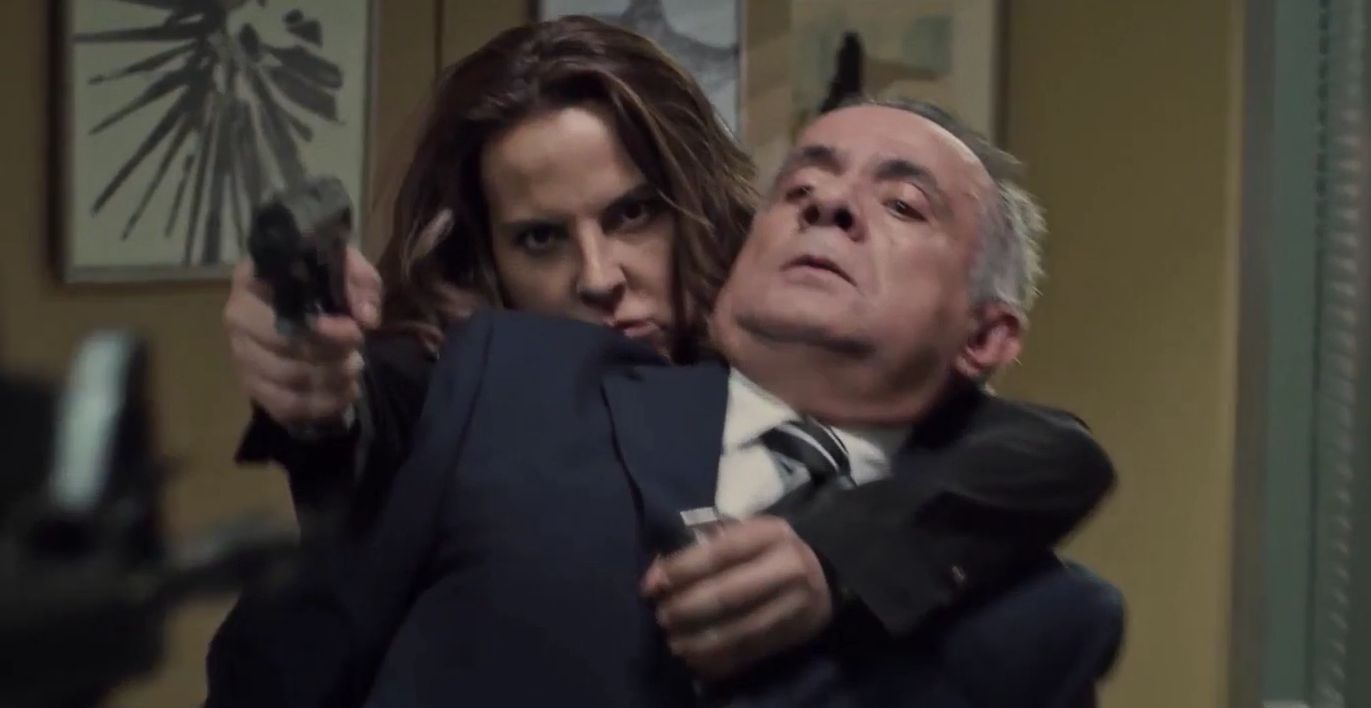 ★★★
★★★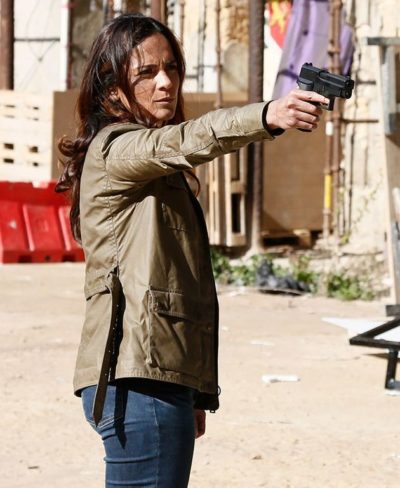 We arrived here with Teresa Mendoza (Braga) having gunned down Don Epifanio, and made an implacable enemy of his estranged wife, Camila Vargas (Falcon). Epifanio had become the Governor of Sinaloa, a position Camila took over, using it to buttress her position at the top. She formed alliances on both sides to assist her further: notably General Cortez (Arias), who provided military muscle, and with DEA agent Alonzo Loya, to whom she fed intelligence about her rivals. However, Camila’s increasingly strained relationship with her teenage daughter ends up being used against her.
We arrived here with Teresa Mendoza (Braga) having gunned down Don Epifanio, and made an implacable enemy of his estranged wife, Camila Vargas (Falcon). Epifanio had become the Governor of Sinaloa, a position Camila took over, using it to buttress her position at the top. She formed alliances on both sides to assist her further: notably General Cortez (Arias), who provided military muscle, and with DEA agent Alonzo Loya, to whom she fed intelligence about her rivals. However, Camila’s increasingly strained relationship with her teenage daughter ends up being used against her.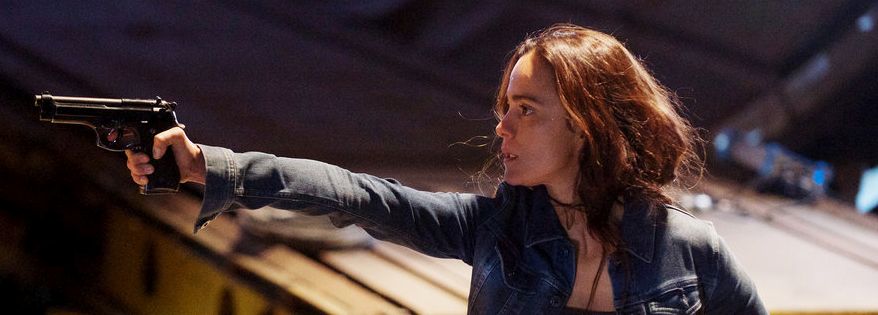
 The 16-part series proved an unexpected sleeper hit in its native land, more than doubling the audience from debut to finale. This is all over the place in terms of genre, with comedy, thriller, romance and action threads. While they aren’t equally successful, it does a pretty decent job of managing most of them, and is surprisingly accessible for a Western audience. The heroine is Do Bong-soon (Park B-Y), the latest in a matriarchal line of very strong women. She has been brought up to keep her power suppressed, due to the potential issues it can cause; Bong-soon has also been warned that if she misuses them, and hurts an undeserving person, they will go away. [Let’s not worry too much about how this presents an easy solution: slap one innocent, and she would become just like everyone else…]
The 16-part series proved an unexpected sleeper hit in its native land, more than doubling the audience from debut to finale. This is all over the place in terms of genre, with comedy, thriller, romance and action threads. While they aren’t equally successful, it does a pretty decent job of managing most of them, and is surprisingly accessible for a Western audience. The heroine is Do Bong-soon (Park B-Y), the latest in a matriarchal line of very strong women. She has been brought up to keep her power suppressed, due to the potential issues it can cause; Bong-soon has also been warned that if she misuses them, and hurts an undeserving person, they will go away. [Let’s not worry too much about how this presents an easy solution: slap one innocent, and she would become just like everyone else…]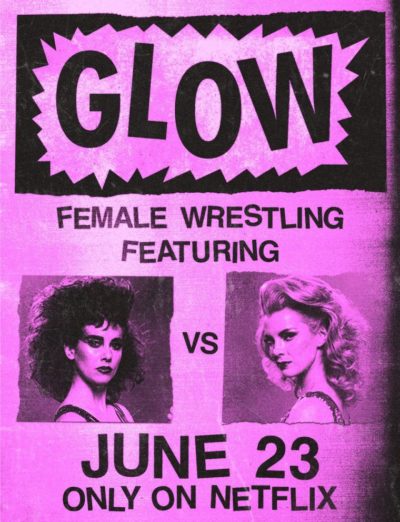 I don’t typically binge-watch shows, being generally content with an episode or two per week. For the second season of GLOW, Netflix’s original series (very) loosely based on 80’s TV show Gorgeous Ladies of Wrestling, we made an exception and blitzed through the series in a couple of days. This in itself is a recommendation – with most of the episodes running barely 30 minutes, it was very much a case of “just one more…” Before we knew it, we were done, and left with a vague feeling of emptiness and slight regret at having burned the 10 episodes so quickly.
I don’t typically binge-watch shows, being generally content with an episode or two per week. For the second season of GLOW, Netflix’s original series (very) loosely based on 80’s TV show Gorgeous Ladies of Wrestling, we made an exception and blitzed through the series in a couple of days. This in itself is a recommendation – with most of the episodes running barely 30 minutes, it was very much a case of “just one more…” Before we knew it, we were done, and left with a vague feeling of emptiness and slight regret at having burned the 10 episodes so quickly.